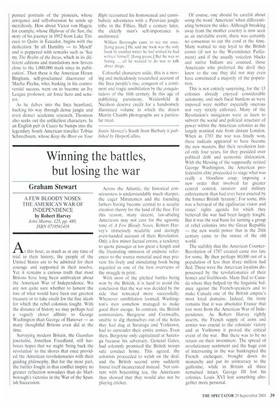Winning the battles, but losing the war
Graham Stewart
A FEW BLOODY NOSES: THE AMERICAN WAR OF INDEPENDENCE by Robert Harvey John Murray, £25, pp. 480. ISBN 0719561418 At this hour, as much as at any time of trial in their history, the people of the United •States are to be admired for their courage and supported in their resolve. Yet it remains a curious truth that most Britons have long been ambivalent about the American War of Independence. We are not quite sure whether to lament the loss of what would have been our greatest treasure or to take credit for the fine ideals for which the rebel colonists fought. With the distance of history we may perhaps feel a vaguely closer affinity to George Washington than George of Hanover — as many thoughtful Britons even did at the time.
Surveying modern Britain, the Guardian journalist, Jonathan Freedland, still harbours hopes that we might 'bring back the revolution' to the shores that once provided the American revolutionaries with their guiding philosophy. But for the most part, the battles fought in that conflict inspire no greater reflection nowadays than do Marlborough's victories in the War of the Spanish Succession.
Across the Atlantic, the historical consciousness is understandably much sharper, the eager Minutemen and the founding fathers having become central to a secular creation theory for the land of the free. For this reason, many decent, law-abiding Americans may not care for the agnostic tone of A Few Bloody Noses, Robert Harvey's immensely readable and daringly even-handed account of their Revolution. Only a few minor factual errors, a tendency to quote passages at too great a length and the frustrating omission of end note references to the source material used may prevent his lively and stimulating book being regarded as one of the best overviews of the struggle in print.
With most of the pitched battles being won by the British, it is hard to avoid the conclusion that the war was decided by the side that retreated more successfully. Whenever annihilation loomed. Washington's men somehow managed to make good their escape. In contrast, the British commanders, Burgoyne and Cornwallis, unable to dig themselves out of the holes they had dug at Saratoga and Yorktown, had to surrender their entire armies. Even then, Burgoyne only capitulated at Saratoga because his adversary, General Gates, had solemnly promised the British troops safe conduct home. This agreed, the colonists proceeded to welsh on the deal, and the British second army suddenly found itself incarcerated instead. Not content with boycotting tea, the Americans thus showed that they would also not be playing cricket. Of course, one should be careful about using the word 'American' when differentiating between the sides. Although breaking away from the mother country is now seen as an inevitable event, there was certainly no consensus to cut the cord at the time. Many wanted to stay loyal to the British crown (if not to the Westminster Parliament) and if the usually voiceless blacks and native Indians are counted, those Americans who preferred the devil they knew to the one they did not may even have constituted a majority of the population.
This is not entirely surprising, for the 13 colonies already enjoyed considerable autonomy, and such fiscal burdens as were imposed were neither especially onerous nor very strictly enforced. Many of the Revolution's instigators were as keen to subvert the social and political structure of power within the American colonies as the largely nominal rule from distant London. When in 1783 the war was finally won, these radicals appeared to have become the new masters. But their revolution lasted only four years, for they presided over political drift and economic dislocation. With the blessing of the supposedly retired George Washington, the American profederalist elite proceeded to stage what was really a bloodless coup, imposing a new order that involved far greater central control, taxation and military enforcement than had ever been exacted by the former British 'tyranny'. For some, this was a betrayal of the egalitarian vision and states' rights agenda for which they believed the war had been largely fought. But it was the real basis for turning a group of rebel colonies into the Great Republic — the new world power that in the 20th century came to the rescue of the old world,
The stability that the American CounterRevolution of 1787 created came too late for some. By then perhaps 80,000 out of a population of less than three million had fled. These were the American loyalists dispossessed by the revolutionaries of their homes and livelihoods. Many fled to Canada where they helped tip the linguistic balance against the French-speakers and to make Canada one of the British empire's most loyal domains. Indeed, the irony remains that it was absolutist France that lost most from the American War of Independence. As Robert Harvey rightly asserts, the French supply of arms and armies was crucial to the colonists' victory and at Yorktown it proved the critical event of the war. But there was to be no return on their investment. The spread of revolutionary sentiment and the huge cost of intervening in the war bankrupted the French exchequer, brought down its monarchy and put its aristocracy to the guillotine, while in Britain all three remained intact. George III lost his colonies. Louis XVI lost something altogether more personal.






































































 Previous page
Previous page